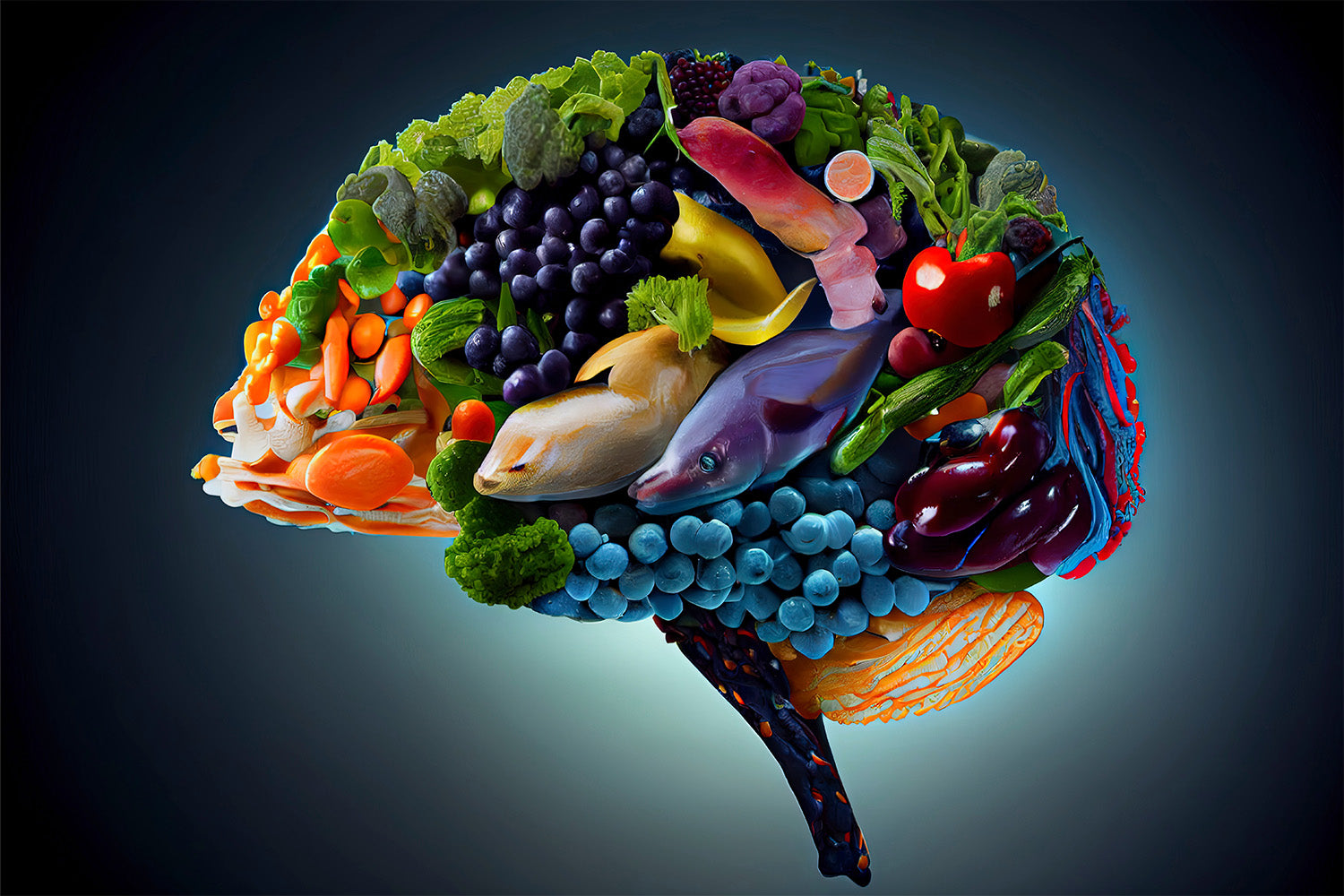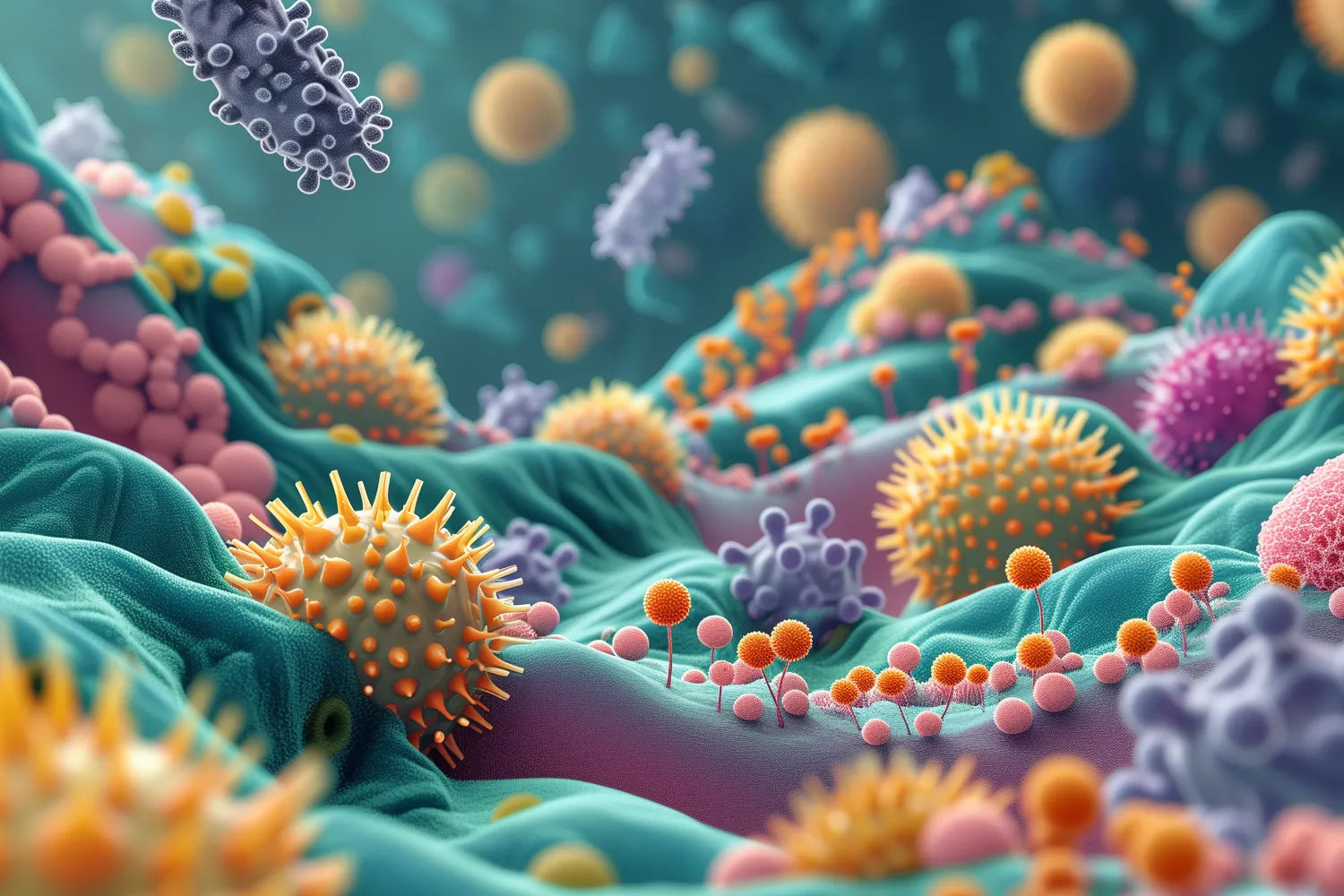
Dr. Eric Venn-Watson’s Highlights
-
- Brain fog refers to a subjective collection of symptoms that can affect people of any age, and includes poor memory, slower reaction time, and the inability to focus.
- Consumption of fatty fish (like sardines, mackerel, and salmon) has been shown to help support brain health due to their omega-3 fatty acid content.
- Taking fatty15, a different fatty acid, can be a better way to support brain health than taking an omega-3 supplement.*
We’ve all been there. You walk into a room and forget why you entered. Your car keys can’t be found. You can’t recall the name of the person you just bumped into at the store. These are all symptoms of brain fog, a condition that can affect practically anyone. Feeling foggy can dramatically impact your overall sense of wellness and impact your quality of life.
If you’ve resolved to take an omega-3 fatty acid supplement to help retain your mental sharpness, you might wonder if it’s really working or if it’s fishy business.
Together, we’ll talk about the benefits of omega-3 for brain health, the best sources of omega-3, and whether or not your fish oil supplement can help you regain your edge.
What Is Brain Fog?
Brain fog isn’t a medical condition, but a group of symptoms that make a person feel “off” in terms of their mental capacity and cognitive performance.
Symptoms of brain fog can include:
- Feelings of confusion
- Loss of mental sharpness
- Inability to recall information that you normally know
- Forgetfulness, poor memory, or memory loss
- Feeling unfocused, distracted, or not present
Brain fog can range in severity from mild cognitive impairment and, in some cases, may be a precursor to more severe age-related illnesses like Alzheimer’s disease.
Most of the time though, the causes aren’t quite as serious.
What Causes Brain Fog?
There are numerous reasons why a person might experience brain fog.
Lack of Sleep
Most experts agree you need between seven to nine hours per night of high-quality sleep. New studies show that sleep deprivation affects the way neurons communicate with one another (synapses) and cause synaptic gaps.
This explains why you feel mentally sluggish after a night of tossing and turning. Your brain cells are misfiring, which can interfere with your reaction time.
A Sedentary Lifestyle
It’s no secret that physical activity is crucial for both your physical and mental health. Exercise is thought to protect your brain against cognitive decline, and even support your brain’s neuroplasticity.
Stress
Stress impacts the body by raising blood pressure, weakening your immune system, and causing changes in mood. Stress can lead to mental fatigue which can trigger feelings of brain fog.
Diet
Improper diet can cause mental fogginess. Specifically, a lack of B complex vitamins like vitamin B12, may make you feel foggy-headed.
Brain fog may also occur if you have a dietary allergy and you ingest the food you are allergic to.
Hormonal Changes
Changes in hormone levels can lead to brain fog.
For instance, hormonal changes during pregnancy can lead to “pregnancy brain,” where a pregnant woman feels forgetful and scatterbrained.
Later in life, hormones due to menopause can also produce cognitive obstacles.
Medical Conditions
Certain medical conditions and illnesses can produce brain fog. Unregulated blood sugar in type II diabetes and viruses like COVID-19 can produce mental fog.
No matter the source of your brain fog, you started taking an omega-3 supplement to fix it. Let’s talk about what omega-3 is and how it works.
What Is Omega-3?
There are three different types of omega-3:
- Docosahexaenoic acid (DHA)
- Eicosapentaenoic acid (EHA)
- Alpha-linolenic Acid (ALA)
Both EPA and DHA are essential to support brain health. They help support brain structure and function, especially in early formative years.
While there’s plenty of data to show that these omega-3 fatty acids support cognitive function, the studies that support them usually relate to the consumption of fatty fish (like sardines or mackerel) in a person’s diet rather than supplementation with a fish oil tablet.
This is important to note, because it means that the omega-3 fatty acid benefits we need to support our brain health are most bioavailable in the foods we eat, not in fish oil capsules.
There are a few reasons why getting your omega-3 from fatty fish is a better option than getting it from a fish oil capsule.
The Achilles Heel of Omega-3
You might be surprised to know that not all omega-3 fatty acids are essential fatty acids. In fact, only ALA is essential. The other essential omega fatty acid is a form of omega-6 called LA. It’s surprising then, that most omega-3 supplements contain both DHA and EHA.
It’s further surprising to learn that most clinical trials that support the benefits of omega-3 supplements only support these benefits from supplements that contain pure EPA (without DHA).
Side Effects of Omega-3
Another not-so-popular topic are the known side effects of omega-3.
First, it’s important to understand that you need to take large amounts of omega-3 supplements to reap the brain health (and heart health) benefits they claim to offer. Usually, that dosage will fall between 2,000 and 3,000 milligrams daily, which translates into eight to 10 fish oil capsules per day.
Unfortunately, the higher the level of omega-3, the higher the risk of unwanted side effects like:
- Low blood pressure
- Thinning of blood
- Excessive bleeding if you have an injury
- Increased risk of bruising
Not to mention, there’s no way to get rid of the fishy aftertaste, even in so-called burpless formulas.
Questionable Ingredients
Omega-3 fatty acids are polyunsaturated fatty acids, which means they are a liquid at room temperature. This is why your fish oil capsules are usually gel caps that contain fish oil liquid.
Because they are liquids at room temperature, they’re subject to lipid peroxidation, which means they can go rancid, just like cooking oil that sits in your cupboard too long. This means that the fish oil can go rancid in your body, too.
Researchers recently found that at least one in 10 bottles of fish oil supplements on store shelves are rancid before they are even purchased and over 50 percent had levels of rancidity at or exceeding toxic levels.
To prevent oxidation, manufacturers frequently add masking flavors and ingredients and sometimes add tocopherols (vitamin E) to the formula as antioxidants to help prevent oxidation.
Even though EPA and DHA are good for our brain health, omega-3 fish oil supplements might not be the best solution for long-term health benefits.
A Better Solution
What if you could erase the fog without risking damage to other important elements of your health? Now, you can, with another essential fatty acid known as C15:0.*
Elevate your cells. Elevate your self.
What Is C15:0?
C15:0 is an odd-chain, saturated fatty and the first essential fatty acid to be discovered since the omegas, over 90 years ago. C15:0 naturally activates PPAR receptors throughout our bodies and brain that can help to reset our circadian clocks, increase the amount of deep sleep we get, and lower our anxiety.
Additionally, our bodies use C15:0 to make a second molecule called PDC that fully activates both CB1 and CB2 receptors, which can help to deepen sleep, reduce anxiety and increase joint comfort.
Further, when compared head to head, C15:0 was found to be better, broader, and safer than the purest form of omega-3:*
- Better. C15:0 is more beneficial to the body than omega-3, with 26 more clinically relevant benefits when stacked against the purest form of omega-3 supplements.
- Broader. C15:0 helps repair twice as many cell types than omega-3. In fact, out of 12 cell types, C15:0 safety repaired 10 of them. Omega-3 could only safely repair four.
- Safer. Speaking of safety, out of the 12 cell types studied, C15:0 was safe for all. Omega-3 was toxic to four of the cell types, including lung and blood vessel cells.
If a supplement isn’t safe for your cells, it isn’t likely the best choice for supporting your overall health.
Cellular Benefits of C15:0
Science shows that C15:0 supports your cells (including those important neural cells in your brain) in three key ways:*
-
Strengthening cell membranes. As we age, our cell membranes become weak and flimsy, making it hard for them to protect our cells. While it’s true some forms of omega-3 support cell membrane development, it’s not a very sturdy lipid. C15:0 is more rigid and integrates into cell membranes to help fortify them.
-
Boosting mitochondrial function. The battery packs inside our cells become sluggish as we age. When our cells don’t have the energy to carry out their function, entire bodily processes and systems can be affected. C15:0 helps improve mitochondrial function by up to 45 percent, so your cells can keep doing their jobs.
-
Improved cellular signaling. Cells must be able to communicate with each other, a process known as cellular signaling. By binding to special receptors located all over the brain and body called PPARs, C15:0 helps regulate processes controlled by the receptors, like mood, cognition, memory, sleep, and even appetite.
- Activating AMPK. By activating this molecule, C15:0 helps restore whole-body homeostasis, regulating functions like glucose uptake and even supporting the immune system. AMPK also helps to clear cells that have lost their function, helping the body rid itself of these inflammatory cells.
- Regulating inflammatory response. C15:) significantly calms and lowers levels of proinflammatory cytokines, a key driver in the aging process.
Keeping our cells healthy is the foundation of our health, and C15:0 does it without a list of adverse side effects. In fact, the only known side effect of C15:0 is decreased snacking between meals, which most Americans would consider beneficial.
How We Get C15:0
C15:0 is found in trace amounts in whole-fat cow’s milk. However, increasing your intake of full-fat dairy products also means taking in excess calories and excess sugars and consuming unhealthy, even-chain saturated fats. A solution? Fatty15.
Fatty15 is the first and only supplement to contain FA15™, the pure, vegan-friendly version of C15:0. Just 100 milligrams per day is enough to restore your circulating levels of C15:0 and support your body and brain.*
Why Take a Supplement?
There are a few reasons why taking a supplement to obtain this essential fatty acid may be beneficial.
- First, it's made ready to absorb. In milk (and other foods), C15:0 is attached to branches of lipids called triacylglycerides, aka triglycerides. That means our gut has to use digestive enzymes to break down these triacylglycerides to release C15:0 as a free fatty acid. Once C15:0 is released, it is ready to be absorbed. These multiple steps can make our absorption of C15:0 from foods less efficient. In contrast, FA15 in fatty15 is our proprietary pure, powder C15:0 ingredient already in free fatty acid form. Less work for the gut, more good C15:0 for our bodies.
- It's not mixed with bad saturated fats. While the good C15:0 fatty acid is present in whole-fat dairy products in trace levels, there are much higher levels of 'bad' even-chain saturated fatty acids that continue to be associated with poorer health. That is probably why studies evaluating the effects of milk on our health are mixed (some say dairy fat is bad for us, while others say it is good for us). Fatty15 provides just the good fat without the bad fats.
- It skips the cows and calories. Whole-fat dairy products provide a wallop of calories, including sugars (aka lactose), that also require - well, cows. The calories in whole-fat milk likely explain why a large-scale recent study showed that adults who drink more dairy milk are more likely to have a higher body weight. Further, the movement to more plant-based milk and meat replacements are driven by a desire for more animal-free products, as well as a desire to veer from cows and cattle because of concerns around methane production. Interestingly, plant-based milk replacements lack C15:0 altogether.
Fatty15 offers a vegan-friendly C15:0, with only one calorie per dose.
Clear the Fog and Get Fatty
When your brain is foggy, you just want clarity. Thankfully, you’ve now got choices, and you can make fatty15 part of your regime to support your whole body and mind health.
Sources:
The impact of stress on body function: A review - PMC
Cognition, Mood and Sleep in Menopausal Transition: The Role of Menopause Hormone Therapy - PMC
Revealed: many common omega-3 fish oil supplements are ‘rancid’

Eric Venn-Watson M.D.
CEO, Co-Founder
Senior Scientist, Co-Founder
Eric is a physician, U.S. Navy veteran, and Co-founder and COO of Seraphina Therapeutics. Eric served over 25 years as a Navy and Marine Corps physician, working with the special forces community to improve their health and fitness. Seraphina Therapeutics is a health and wellness company dedicated to advancing global health through the discovery of essential fatty acids and micronutrient therapeutics.
You May Also Like...
10 Foods Good for Your Liver: The Ultimate Guide
Your liver does a lot for you. If it had a voice of its own, it might ask you to eat more veggies and cut back on your Old Fashioneds. Unfortunately, the liver doesn’t receive a lot of attention until...
How To Improve Your Gut Microbiome: 6 Tips
Interested in how to improve your gut microbiome? We’ve got six tips to help your gut thrive and improve your overall digestion.


